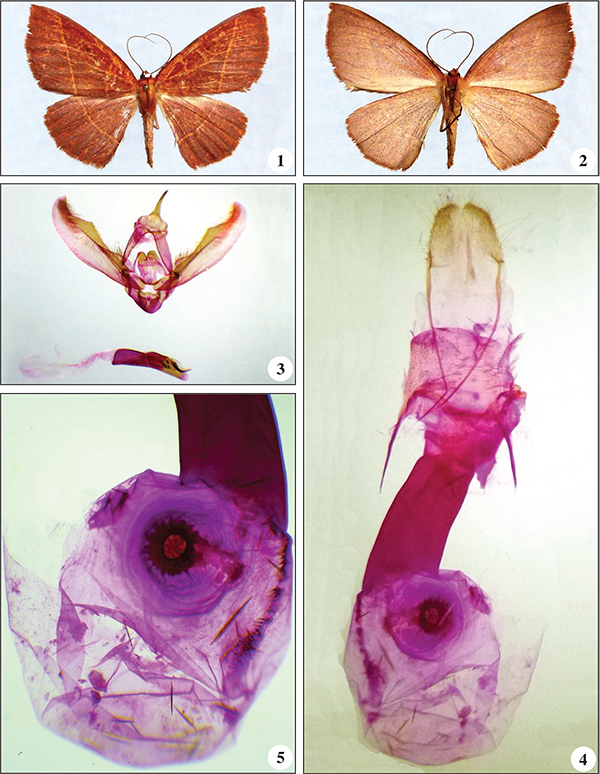

A new species of the genus Platycerota Hampson, 1893 from Myanmar (Burma) (Lepidoptera: Geometridae, Ennominae, Baptini)
Una nueva especie del género Platycerota Hampson, 1893 de Myanmar (Birmania) (Lepidoptera: Geometridae, Ennominae, Baptini)
A new species of the genus Platycerota Hampson, 1893 from Myanmar (Burma) (Lepidoptera: Geometridae, Ennominae, Baptini)
SHILAP Revista de Lepidopterología, vol. 46, no. 184, 2018
Sociedad Hispano-Luso-Americana de Lepidopterología
Received: 12 July 2018
Accepted: 10 August 2018
Published: 30 December 2018
Abstract: Platycerota birmaniae Expósito, sp. n. from Myanmar. The adult and the genitalia of male and female are illustrated.
Keywords: Lepidoptera, Geometridae, Ennominae, Baptini, Platycerota, new species, Myanmar (Burma).
Resumen: Se describe Platycerota birmaniae Expósito, sp. n. de Myanmar. Se ilustran el adulto y la genitalia del macho y de la hembra.
Palabras clave: Lepidoptera, Geometridae, Ennominae, Baptini, Platycerota, nueva especie, Myanmar (Birmania).
Introduction
The genus Platycerota Hampson, 1893 was described from India, the type-species is Ennomos?spilotelaria Walker, 1862. HOLLOWAY (1993: 80-82) studied the genus and included three species of Borneo. PARSONS et al. (1999: 764) included eight species in Platycerota and STÜNING (2000: 109-110) increased the number of species of the genus, establishing the synonymy Platycerota Hampson, 1893 (= Crypsicometa Warren, 1894). A thirteenth species of Platycerota is described below.
Taxonomy
Platycerota birmaniaeExpósito, sp. n. (Figs 1-5)
Material examined: Holotype ♂ with the slide AEH 3293. Paratype 1 ♀ with the slide AEH 3294. Paratype 2 ♀♀ (Figs 1-2) and Paratype 3 ♂♂ and Paratype 4 ♀♀. Data of all the specimens.- Route to Mt. Emaw Bum by Kanphant, 26o 09’ 23.2”N, 98o 31’ 16,4” E, 2358 m above sea level, 28- V-2006. Kachin State Province. Myanmar (Birmania) (Michael Langer, Stefan Naumann & Swen Löffer leg.). The type material is deposited in the collection of Andrés Expósito-Hermosa, Móstoles, Madrid (Spain).
Description (Figs 1-2): The wing span is 34-38 mm in males and 39-42 mm in females. The dorsal part of the body is of the same colour as the ground colour of wings’ upperside, the underside of body is concolorous with the underside of wings. Head: The palpi are short, vertex and base of the antennae with white scales, the antennae filiform in both sexes. The ground colour of specimens varies from orange-red to orange-off tone: numbers 172 and 192 of SÉGUY (1936), with sprinkling of black scales. The forewing with a curved basal line and another straight postmedian line of variable colour: inner part black and white or grey outside. The trace of the postmedian line can be continuous or discontinuous, but that of the basal line is always continuous. Forewing with a black apical point. There is no curved line in the area of the forewing apex. The tornus of forewing is smoothly rounded. Hindwings of the same colour, but the postmedian line is curved and the basal line is missing and the costal area is lighter colored. The underside of wings is the same colour as the front but more dull and the lines and apical point are missing. Hind tibia of both sexes with two pairs of spurs.
Male genitalia ♂ (Fig. 3): The distal part of uncus ends in a sharp point. The socii are roundish and a little pilose. The tegumen is of isosceles triangle shape. The costa of valva bears a characteristic central triangular dilation. The sacculus is without processes. The juxta is bilobed. The vinculum is short and the saccus with a slit in the center. The robust aedeagus with its proximal zone straight and its distal part with two small cornuti on the vesica and a larger cornutus having the form of a hook.
Female genitalia ♀ (Figs 4-5): The posterior apophyses are longer and thinner than the anterior ones that are thicker. The antrum with inverted triangular shape. The ductus bursae is very strongly sclerotized, long, the bursa copulatrix is spherical; there is a longitudinal fold in it with multiple spines that reaches the ductus bursae area. The signum (Fig. 5) with a circular crown with multiple barbs in its peripheral circle, the central area is lighter with some dark spots; the periphery of the signum with a series of concentric circles.
Distribution
Endemicity of Kachin State, MYANMAR (Burma).
Remarks
The new species has genitalic characters fitting with those of Platycerota, however the external appearance is alike Eurychoria trajecta Prout, 1932. The criterion of STÜNING (2000) has been maintained for Platycerota in this work.
Etymology
This species is called birmaniae, the name derived from the Birmania (Burma) in the genitive case.

Figs. 1-5.– Platycerota birmaniae Expósito sp. n. 1. Paratype 3, 0 upperside of wings. 2. Paratype 3, underside of wings. 3. Holotype 1 slide AEH 3293. 4. Paratype 1, 0 slide AEH 3294. 5. Detail of the female genitalia with the signum enlarged; slide (dorsal view) AEH 3294. Figs. 1-5.– Platycerota birmaniae Expósito sp. n. 1. Paratype 3, 0 upperside of wings. 2. Paratype 3, underside of wings. 3. Holotype 1 slide AEH 3293. 4. Paratype 1, 0 slide AEH 3294. 5. Detail of the female genitalia with the signum enlarged; slide (dorsal view) AEH 3294.
Acknowledgements
Very grateful to Jaan Viidalepp for his very considerate help and translation into English of the original text in Spanish, to Jeremy D. Holloway for his advice and finally to Swen Löffer for his previous collaboration.
References
HOLLOWAY, J. D., 1994.– The Moths of Borneo, part 11: Geometridae, Ennominae.– Malayan Nature Journal, 47: 1-309, 19 pls.
PARSONS, M. S., SCOBLE, M. J., HONEY, M. R., PITKIN, L. M. & PITKIN, B. R., 1999.– Geometrid Moths of the World: A Catalogue (Lepidoptera, Geometridae): 1016 pp. + Index 129 pp. CSIRO Publishing / Apollo Books. Collingwood / Stenstrup.
SÉGUY, E., 1936.– Code Universel des Couleurs: 68 pp. 55 pls. Paul Lechevalier Editeur. Paris.
STÜNING, D., 2000.– Additional notes on the Ennominae of Nepal, with descriptions of eight new species (Geometridae) Part 6.– Tinea, 16(Supplements 1): 94-152, plate 170-172.